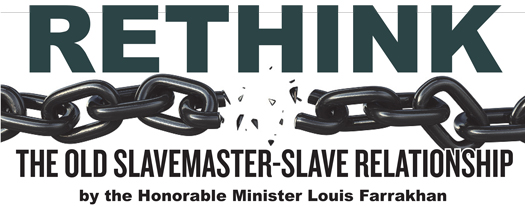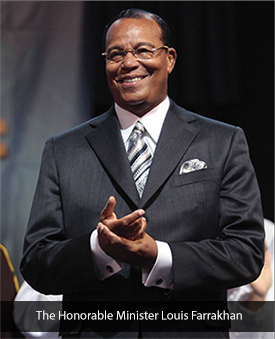Rethink The Old Slavemaster-Slave Relationship
By the Honorable Minister Louis Farrakhan | Last updated: Sep 11, 2018 - 10:52:02 AMWhat's your opinion on this article?

|
[Editor’s note: The following article is based on excerpts from “Rethink the Old Slavemaster-Slave Relationship,” “Redirect Black Spending to Black Business” and “Support the Nation of Islam’s 3-Year Economic Program from Chapter Five of ‘A Torchlight for America,’” written by the Honorable Minister Louis Farrakhan and published in 1993.]
In The Name of Allah, The Beneficent, The Merciful.
The question to Black leadership is, can you depend on a benevolent White leader to look after our poor when the country is under such severe constraints? We know that former generations of Whites are responsible for putting Black people in our current condition. However, conditions force us to think creatively to help ourselves or go down with this ailing economy. By helping ourselves, we will relieve the country of some of its burdens, and we will be performing a duty imposed on us by our Creator, which is the duty of doing something to help self.

|
Black leadership must re-orient its thinking to self-help and then come up with creative solutions to our economic plight. We can, we will, we must help ourselves.
***
Black people have over $750 billion in spending power. Yet, as soon as the dollar enters our community, it exits almost immediately.The dollar does not circulate to a Black bank to pay the mortgage nor to a Black-owned grocery store to buy food nor to a Black fashion designer nor retailer to buy clothing. The money enters our community in the form of a paycheck and exits to a bank, a cleaners, a record store, and to all of those outside the community who provide goods and services for us.
In the “Souls of Black Folks,” W.E.B. DuBois wrote:“The holocaust of war (and slavery), the terrors of the Ku Klux Klan, the lies of carpetbaggers (from the North), the disorganization of industry, and the contradictory advice of friends and foes, left the bewildered slave with no new watchword beyond the old cry for freedom.
“A people thus handicapped ought not to be asked to race with the world, but rather allowed to give all its time and thought to its own social problems.”
It appears that integration has only meant the surrendering of our dollars to others so that they can enhance their lives while our businesses close and our problems remain unattended. We must look like a very foolish people in the eyes of others who nurse themselves to economic strength on our earnings and then abandon us and ridicule us as they advance and leave us further behind. We need to turn constructively inward, pool our resources intellectually and financially, and begin to build a future for ourselves and our children. We must patronize ourselves, as others patronize themselves. This is the way to build a viable economy and earn the respect of self and others.
Black scholars, professionals, organizations and the wealthy among us must be charged with the responsibility of using our resources to build the economic institutions that our people need. We can promote the idea of “buying Black,” but we must have something manufactured by Blacks to buy. More of us need to come out of corporate America with the skills that we have acquired and build businesses that service the needs of our community.
***

|
The 3-Year Economic Savings Program is not designed to be a burden on anyone. We simply ask participants to contribute a nominal amount to a financial pool each month, for a minimum commitment of three years. In many cases, this contribution is made from personal savings that are gained by changing one’s lifestyle for the better.
For example, smoking is a deadly habit that, when stopped, can yield a substantial amount of savings. If you are a smoker, how much do you pay for cigarettes? $2.60? Some of you buy two and three packs per day. When you go to a concert, how much do you pay? $30? How many meals do you eat and what do you pay for that cheap food? How much do you pay for those drugs in your medicine cabinet, or the ones from the dope pusher?
We do not smoke, drink or use dope. We eat one meal a day and don’t excessively go to movies and concerts. So this change in lifestyle results in money in our pockets. The money that we save from cleaning up our lifestyle is money that we can invest in developing economically.
Even if America does not help us, with a change in our lifestyle we can begin to use that $750 billion that circulates into our community to build agribusiness, low-income housing, develop clothing manufacturing, establish banks, and create all the economic entities that our people need. If we look at the money we spend each year on frivolous and destructive pursuits, with those who do not have our interests at heart, we can start taking some of this back to ourselves.
We can fulfill the scripture as it is written in the Book of Isaiah that, “they shall repair the wasted cities, the desolations of many generations.” (Isaiah 61:4) We can create job opportunities and restore dignity to ourselves.
We can start rebuilding the cities of Los Angeles and Chicago, where the gangs have been willing to enter into a truce, yet there is no economic plan to provide these youth with a source of earning a living.
The government should support our efforts with The 3-Year Economic Savings Program because, in reality, we will be relieving the pressure on the government. The government should allow participants to allocate a portion of their taxes, say 15 percent, to go toward The 3-Year Economic Savings Program so that we can begin to make ourselves self-sufficient.
America will benefit from a productive Black people from whom the country might unlearn the mental sickness of White supremacy. It is hard to call us n----rs when we are productive. It is hard to say we are nothing when you see us as a dignified, civilized people.
We are the ones who can destroy the mentality of White supremacy and the thought in others that we are subhuman and inferior, by promoting respect among Black people by what we accomplish in the way of building and doing for self.
INSIDE STORIES AND REVIEWS
-
-
About Harriett ... and the Negro Hollywood Road Show
By Rabiah Muhammad, Guest Columnist » Full Story -
Skepticism greets Jay-Z, NFL talk of inspiring change
By Bryan 18X Crawford and Richard B. Muhammad The Final Call Newspaper @TheFinalCall » Full Story -
The painful problem of Black girls and suicide
By Charlene Muhammad -National Correspondent- » Full Story -
Exploitation of Innocence - Report: Perceptions, policies hurting Black girls
By Charlene Muhammad -National Correspondent- » Full Story -
Big Ballin: Big ideas fuel a father’s Big Baller Brand and brash business sense
By Bryan Crawford -Contributing Writer- » Full Story






 Click Here Stay Connected!
Click Here Stay Connected!








